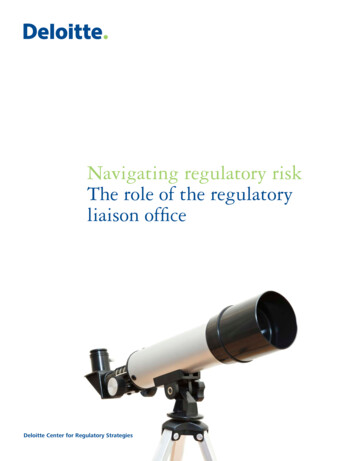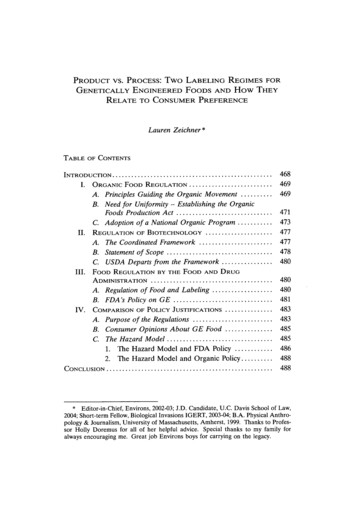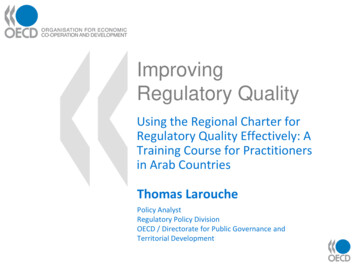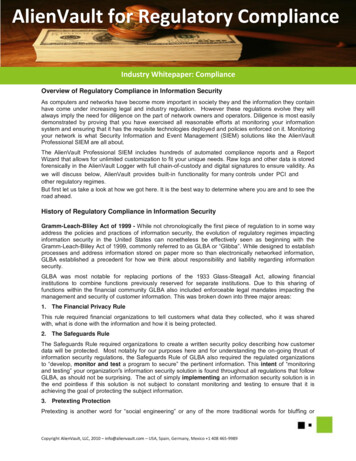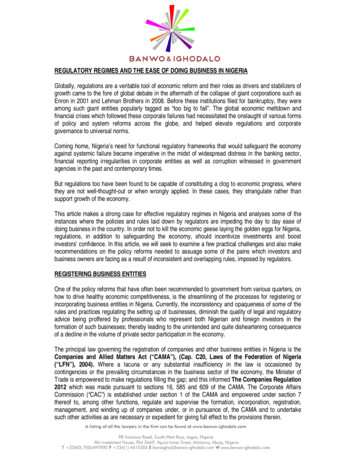
Transcription
REGULATORY REGIMES AND THE EASE OF DOING BUSINESS IN NIGERIAGlobally, regulations are a veritable tool of economic reform and their roles as drivers and stabilizers ofgrowth came to the fore of global debate in the aftermath of the collapse of giant corporations such asEnron in 2001 and Lehman Brothers in 2008. Before these institutions filed for bankruptcy, they wereamong such giant entities popularly tagged as “too big to fail”. The global economic meltdown andfinancial crises which followed these corporate failures had necessitated the onslaught of various formsof policy and system reforms across the globe, and helped elevate regulations and corporategovernance to universal norms.Coming home, Nigeria’s need for functional regulatory frameworks that would safeguard the economyagainst systemic failure became imperative in the midst of widespread distress in the banking sector,financial reporting irregularities in corporate entities as well as corruption witnessed in governmentagencies in the past and contemporary times.But regulations too have been found to be capable of constituting a clog to economic progress, wherethey are not well-thought-out or when wrongly applied. In these cases, they strangulate rather thansupport growth of the economy.This article makes a strong case for effective regulatory regimes in Nigeria and analyses some of theinstances where the policies and rules laid down by regulators are impeding the day to day ease ofdoing business in the country. In order not to kill the economic geese laying the golden eggs for Nigeria,regulations, in addition to safeguarding the economy, should incentivize investments and boostinvestors’ confidence. In this article, we will seek to examine a few practical challenges and also makerecommendations on the policy reforms needed to assuage some of the pains which investors andbusiness owners are facing as a result of inconsistent and overlapping rules, imposed by regulators.REGISTERING BUSINESS ENTITIESOne of the policy reforms that have often been recommended to government from various quarters, onhow to drive healthy economic competitiveness, is the streamlining of the processes for registering orincorporating business entities in Nigeria. Currently, the inconsistency and opaqueness of some of therules and practices regulating the setting up of businesses, diminish the quality of legal and regulatoryadvice being proffered by professionals who represent both Nigerian and foreign investors in theformation of such businesses; thereby leading to the unintended and quite disheartening consequenceof a decline in the volume of private sector participation in the economy.The principal law governing the registration of companies and other business entities in Nigeria is theCompanies and Allied Matters Act (“CAMA”), (Cap. C20, Laws of the Federation of Nigeria(“LFN”), 2004). Where a lacuna or any substantial insufficiency in the law is occasioned bycontingencies or the prevailing circumstances in the business sector of the economy, the Minister ofTrade is empowered to make regulations filling the gap; and this informed The Companies Regulation2012 which was made pursuant to sections 16, 585 and 609 of the CAMA. The Corporate AffairsCommission (“CAC”) is established under section 1 of the CAMA and empowered under section 7thereof to, among other functions, regulate and supervise the formation, incorporation, registration,management, and winding up of companies under, or in pursuance of, the CAMA and to undertakesuch other activities as are necessary or expedient for giving full effect to the provisions therein.
Curiously, professionals such as solicitors who work within the legal regime for establishing businessentities in Nigeria are still, undeservedly, faced with difficulties while representing their clients at theCAC. This is so because new, sometimes unpublicised regulations and/or conditions which are outsidethe extant laws, are imposed with little or no prior notice.Two recent examples of undocumented rules that slow down the registration/incorporation of businessentities at the CAC are; (i) the new rule on the composition of the board of directors of engineering andarchitectural companies in formation and (ii) the nationality of the person who is the Secretary of acompany (under incorporation) in Nigeria.Applications for the incorporation of engineering companies in recent times have been turned down bythe CAC, for the mere fact that none of the directors of the companies in formation are “CORENregistered” i.e. licensed by the Council for the Regulation of Engineering in Nigeria. Similarly,applications for the registration of architectural firms have been refused for not having any of the preincorporation directors as “ARCON-registered” i.e. licensed by the Architects Registration Council ofNigeria. Before now, the CAC only required certificates of training or proficiency in the various fields ofengineering or architecture from persons who are the first directors of these types of companies.Clearly the CAC, by the additional requirement of professional registration for engineers and architects,is enforcing compliance with the relevant provisions of the Engineers (Registration, etc.) Act, CapE11, LFN 2004 (“ERA”) and the Architects (Registration, etc.) Act, Cap A19, LFN 2004 (“ARCONAct”); which respectively provide that engineers and architects must be registered with COREN andARCON to practise in Nigeria. However, while the ERA in section 6 makes provision for the registrationof all qualified engineering firms and personnel wishing to practise in Nigeria, the ARCON Act in section1 provides only for the registration of qualified persons who are Nigerian citizens. So, while the statutoryrestriction of registration only to Nigerian citizens (in the case of ARCON) is a challenge to openparticipation by foreigners in the economy, the CAC’s approach to enforcing compliance without priornotice or documentation further worsens the business climate for investors.Also, the CAC has recently demanded that a person who is the Secretary of a company underincorporation in Nigeria must be a Nigerian. This new rule (which, to the best of our knowledge remainsundocumented) is discouraging, particularly to foreign private companies operating or looking tooperate in Nigeria, and who may prefer to have their expatriate personnel with the prescribedqualifications and statutory permits serve as company secretaries. Section 295 of the CAMA specifiesthe qualifications of a company secretary in Nigeria and these do not include nationality. This rule onthe nationality of the company secretary is in a way, a disincentive to foreign participation in theeconomy and is not in sync with the principle of trade liberalisation that is driving competitiveness andgrowth, in other emerging economies.At the very least, whatever the intendments of these new pre-incorporation rules administered by theCAC are, they ought to be legitimately made, properly documented and well publicised to reduce casesof administrative impediments and frustrations confronting the setting up of businesses in Nigeria. TheCAC may advocate a review of the Companies Regulation 2012 to contain its new incorporationrequirements, so as to ensure certainty and uniformity of rules.Another thorny issue affecting business registration is the lack of harmonization between the databanks of the CAC and other agencies with similar functions; particularly the Commercial Law2
Department of the Federal Ministry of Industry, Trade & Investment ("trademark registry"). While theCAC registers business/company names, the trademark registry registers trademarks and patents suchas names, logos, slogans, domain names, shapes and colours etc. Interestingly, sections 30(1)(a)&(d),579(1)(d)&(e) and 593(a) of the CAMA prohibit the registration of any name that is similar to the nameof an existing business, company or any entity that is duly registered under the CAMA; or of anyexisting trade mark or sign duly registered in Nigeria. In practice, implementing this law has become avery arduous task. Often, business owners/entities with names that are duly registered at the CAC,subsequently discover at the trademark registry that trademarks similar to their existing businessnames have been registered by other persons; thereby making it impossible for them to register theirown trademarks.To end the confusion that these overlapping regimes administered by the CAC and trademark registrycreate, and consequently curb the pain and frustration experienced by investors and business entities,these two registering authorities must streamline their processes.(To be continued next week)TRANSFER OF FOREIGN CAPITALIn the process of doing business in Nigeria, foreign investors who incorporate Nigerian companies, ormake equity investments into Nigerian companies, or advance loans to local associates/subsidiaries,have had to transfer investment capital into the country.Foreign Capital, under the provisions of section 31 of the Nigerian Investment PromotionCommission (“NIPC”) Act, (Cap. 117 LFN 2004);“means convertible currency, plant, machinery, equipment, spareparts, raw materials and other business assets, other than goodwill,that are brought into Nigeria with no initial disbursement of Nigerianforeign exchange and are intended for the production of goods andservices related to an enterprise to which this Act applies.”However, it is worrisome to see Solicitors often facing difficulties from administrative rules beingimplemented by relevant agencies of government in connection with the importation of foreign capitalinto Nigeria.Where the capital transferred is a foreign technology i.e. technical expertise, plant, machinery,engineering supply, training facilities, trade mark & patent rights etc., the commercial contract oragreement in respect of such a foreign technology is required under section 5(2) of the National Officefor Technology Acquisition and Promotion (“NOTAP”) Act, (Cap. N62, LFN 2004) to be registeredwith NOTAP – the regulatory agency – not later than sixty days from the execution or conclusion of thecontract.One of the NOTAP regulations, which discourages inflow of foreign technology, states that all mattersrelating to foreign technologies transferred into the country shall be governed by either the Nigerian lawor the law of any other country that is neutral to both the transferor (the foreign party) and the transferee(the Nigerian party). In practice, where the transfer relates to a federal government project, NOTAPalways insists that the governing law shall be Nigeria’s but where it involves two parties none of which3
is a government agency (two companies/organisations), the required governing law is either Nigeria’sor that of a neutral jurisdiction.The rationale behind this regulation is that the transferee is always in a weaker bargaining position thanthe transferor while negotiating such contract for the transfer of technology, and as such should beprotected. This practice has the effect of forcing, instead of encouraging, the transferors of foreigntechnologies into submitting to the Nigerian jurisdiction (governing statutes and the courts). This mayactually be counter-productive for a developing country like Nigeria that is in dire need of technologicaladvancement and the regulatory authority must thus find a balance.A better practice will be one that allows the two contracting parties to a contract for the transfer offoreign technologies, to freely and in the spirit of consensus ad idem, agree on the law that will governtheir relationship. NOTAP is commissioned under its enabling law (see section 4(b), NOTAP Act) tofacilitate “the development of the negotiation skills of Nigerians with a view to ensuring the acquirementof the best contractual terms and conditions by Nigerian parties entering into any contract or agreementfor the transfer of foreign technology”. It is instructive to note that only a free atmosphere of constantmutual relations (supervised to avoid only unduly onerous terms), rather than a protectionist-policy, canhelp improve the negotiation skills of Nigerian parties.Equally worthy of mention is the challenge facing foreign investments in Nigeria. A foreign investordesirous of doing business in Nigeria is expected to procure a business permit from the FederalMinistry of Interior and also procure expatriate quota approvals, where such foreign investor intends tohire expatriate staff. One of the current requirements for the issuance of a business permit and/orexpatriate quota approvals is the provision of evidence of importation of machinery and equipment forinvestment as equity or loan, for which a Certificate of Capital Importation (“CCI”) in the amount of 300,000 (Three Hundred Thousand US Dollars), must be obtained by the investor.Respectfully, the 300,000 investment requirement amounts to a form of trade barrier and adisincentive to foreign investments in Nigeria. In an era of globalisation in which free trade amongnations of the world is consciously being promoted, it becomes a burden for a nation like Nigeria that isa signatory to the World Trade Organisation’s Free Trade Agreements to place such a high “tariff” oninternational commercial transactions in its economy. Again, this works to defeat the original purpose ofthe NIPC, which is to facilitate foreign direct investments and foreign portfolio investments into thecountry through the means of attractive incentives. This requirement would also not be realistic inrelation to investments which are not so capital intensive at commencement and which would only needto import such significant amounts of foreign capital into Nigeria over a longer period of time. Asubstantial reduction in the value of the required CCI is recommended or in the alternative, a processwhereby such investments are staggered over a definite period, so as to enhance the ease with whichforeign participation takes place in the Nigerian economy.Whilst not specifically pertaining to transfer of capital, it is also a notable challenge that businessentities applying for pioneer status (a tax incentive available to highly technical industries and thoseestablished in economically disadvantaged locations, as well as investments made in sectors that aredesignated as priority areas of the economy) in Nigeria face difficulties in processing their applicationsat the NIPC. Many of the qualifications quoted for this incentive lack clarity and the list of criteria and/oreligibility requirements are amended from time to time; thus posing impediments to the enjoyment of theincentive by domestic and foreign investors alike.4
Again, the NIPC’s Pioneer Status Incentive Regulations 2014 levy a “service charge” to be paid by acompany applying for this incentive. The charge is to be determined by the NIPC at 2% of thecompany’s estimated tax savings derived from the five-year financial projections. This charge is alsocompulsory regardless of profitability such that, where a company records losses in its financialprojections, it will be calculated based on either its net assets at 0.5% or the turnover at 0.25%. Ineffect, applying for pioneer status in many instances actually results in additional costs to companiesand undermines the benefit of tax holiday that is sought in the first place.In order not to defeat the primary purpose for instituting pioneer status as an investment incentive, it isimperative for the NIPC to streamline its eligibility criteria and develop a stable, workable and wellpublicized body of rules that will guide investors and the business community as a whole.THE NIPC ONE-STOP-INVESTMENT-CENTERThe One-Stop-Investment-Center (“OSIC”) is an initiative of the government to enhance the ease ofdoing business and facilitate investments in Nigeria, by bringing relevant governmentagencies/regulators to one location; where all statutory approvals and documents required to set upenterprises or invest in the Nigerian economy can be processed and obtained seamlessly withouthaving to visit the agencies/regulators separately. The OSIC is located at the NIPC, which isestablished under section 1 of the NIPC Act and empowered under section 4 thereof to encourage,promote and coordinate both domestic and foreign investments in the Nigerian economy.In theory, the OSIC is to enhance the ease of doing business in Nigeria but in practice has failed, moreoften than not, to add any value to the investment-chain. Over the years, the OSIC too has relapsedinto the typical public service bureaucracy and inefficiency.Ostensibly, in order to achieve the objective of setting up the OSIC, each of the government agenciesrelevant to doing business in Nigeria maintains a desk at the center; such as the CAC, NIPC, NOTAP,Central Bank of Nigeria (“CBN”), Federal Inland Revenue Service (“FIRS”), Nigeria Immigration Service(“NIS”), Nigeria Customs Service (“NCS”), and National Agency For Food and Drug Administration andControl (“NAFDAC”) etc. Therefore, a foreign company seeking to operate in Nigeria, for example,should ordinarily visit the OSIC to incorporate a Nigerian associate company at the CAC desk; registerthe Nigerian company with the NIPC; and obtain the statutory and immigration documents such asbusiness permit, residence permits and expatriate quota at the Ministry of Interior (NIS desk). But poorservice delivery and lack of proper coordination among the agencies render the OSIC inefficient. So,while investors who visit the OSIC should ordinarily take the advantage of localisation of services, theyare still forced to visit the agencies separately after leaving the NIPC-OSIC.In other to salvage the OSIC initiative from becoming a disincentive to investments, the variousregulatory agencies operating from the center must invest more time and effort in training theirpersonnel, automate and upgrade their services to provide online-real-time access, prioritize theapplications filed at their OSIC desks slightly over the ones at their regular offices, and embark onappropriate synergy among their various operating systems. Furthermore, all sector-specific regulatorsthat have the duty of licensing registered business entities before they can commence operations in thespecific sectors in Nigeria should be directed by their supervising ministries or authorities to maintainoffices/desks at the OSIC; if they do not operate one currently.5
CONCLUSIONSRegulators have a pivotal role to play in improving Nigeria’s business climate and scaling up thecountry’s growth trajectory through stimulated economic competitiveness. This vital role can beeffectively played without necessarily compromising standards, if the right balance is struck betweengrowth and ethics. In other climes where regulators have successfully acted as catalysts for growth, aseamless, non-overlapping and non-conflicting legal framework has always been a striking feature.In the advanced OECD economies, workable and streamlined corporate governance structures, thatare preventive rather than just punitive, have helped regulators achieve high level of regulatorycompliance by economic actors – business entities – without causing much pain (Nigerian regulatorssuch as the Nigerian Stock Exchange, Securities and Exchange Commission, Financial ReportingCouncil of Nigeria, Standard Organisation of Nigeria, CBN, Nigerian Deposit Insurance Corporation,National Pension Commission, National Insurance Commission, Nigerian CommunicationsCommission, NAFDAC, Department of Petroleum Resources, etc. should take a cue from this). This iswhy these countries continue to maintain high positions yearly on both the World Bank’s DoingBusiness Report and the World Economic Forum’s Global Competitiveness Index.When asked how Ghana, a comparatively smaller economy but with a better rating than Nigeria on the2015 Ease of Doing Business Index (“EODBI”), has been able to get things done efficiently and by sodoing, drive its economic competitiveness significantly upward, Dr. Ekwow Spio-Garbrah, Ghana’sMinister for Trade and Industry repeatedly emphasized that the government has constantly providedsupport and created a mutually benefiting regime in which the trio of regulators, investors and the Statejointly take ownership of the enterprise system and become partners in progress. Undoubtedly, Nigeriawould also do well to adopt such an inclusive and collaborative model.The Grey Matter Concept is an initiative of the law firm, Banwo & IghodaloDISCLAIMER: This article is only intended to provide general information on the subject matter and does not by itself createa client/attorney relationship between readers and our Law Firm. Specialist legal advice should be sought about the readers’specific circumstances when they arise.6
company (under incorporation) in Nigeria. Applications for the incorporation of engineering companies in recent times have been turned down by the CAC, for the mere fact that none of the directors of the companies in formation are "COREN-registered" i.e. licensed by the Council for the Regulation of Engineering in Nigeria.




